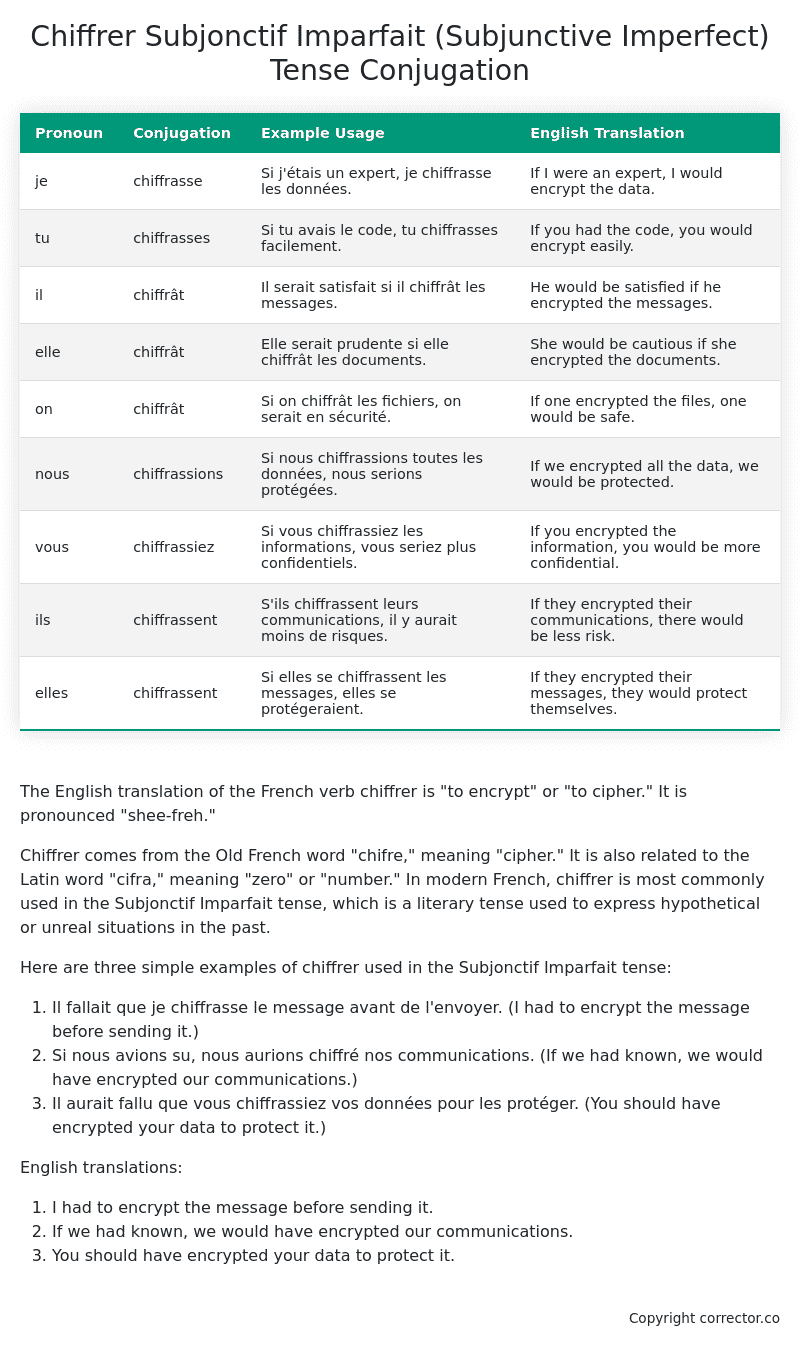Subjonctif Imparfait (Subjunctive Imperfect) Tense Conjugation of the French Verb chiffrer
Introduction to the verb chiffrer
The English translation of the French verb chiffrer is “to encrypt” or “to cipher.” It is pronounced “shee-freh.”
Chiffrer comes from the Old French word “chifre,” meaning “cipher.” It is also related to the Latin word “cifra,” meaning “zero” or “number.” In modern French, chiffrer is most commonly used in the Subjonctif Imparfait tense, which is a literary tense used to express hypothetical or unreal situations in the past.
Here are three simple examples of chiffrer used in the Subjonctif Imparfait tense:
- Il fallait que je chiffrasse le message avant de l’envoyer. (I had to encrypt the message before sending it.)
- Si nous avions su, nous aurions chiffré nos communications. (If we had known, we would have encrypted our communications.)
- Il aurait fallu que vous chiffrassiez vos données pour les protéger. (You should have encrypted your data to protect it.)
English translations:
- I had to encrypt the message before sending it.
- If we had known, we would have encrypted our communications.
- You should have encrypted your data to protect it.
Table of the Subjonctif Imparfait (Subjunctive Imperfect) Tense Conjugation of chiffrer
| Pronoun | Conjugation | Example Usage | English Translation |
|---|---|---|---|
| je | chiffrasse | Si j’étais un expert, je chiffrasse les données. | If I were an expert, I would encrypt the data. |
| tu | chiffrasses | Si tu avais le code, tu chiffrasses facilement. | If you had the code, you would encrypt easily. |
| il | chiffrât | Il serait satisfait si il chiffrât les messages. | He would be satisfied if he encrypted the messages. |
| elle | chiffrât | Elle serait prudente si elle chiffrât les documents. | She would be cautious if she encrypted the documents. |
| on | chiffrât | Si on chiffrât les fichiers, on serait en sécurité. | If one encrypted the files, one would be safe. |
| nous | chiffrassions | Si nous chiffrassions toutes les données, nous serions protégées. | If we encrypted all the data, we would be protected. |
| vous | chiffrassiez | Si vous chiffrassiez les informations, vous seriez plus confidentiels. | If you encrypted the information, you would be more confidential. |
| ils | chiffrassent | S’ils chiffrassent leurs communications, il y aurait moins de risques. | If they encrypted their communications, there would be less risk. |
| elles | chiffrassent | Si elles se chiffrassent les messages, elles se protégeraient. | If they encrypted their messages, they would protect themselves. |
Other Conjugations for Chiffrer.
Le Present (Present Tense) Conjugation of the French Verb chiffrer
Imparfait (Imperfect) Tense Conjugation of the French Verb chiffrer
Passé Simple (Simple Past) Tense Conjugation of the French Verb chiffrer
Passé Composé (Present Perfect) Tense Conjugation of the French Verb chiffrer
Futur Simple (Simple Future) Tense Conjugation of the French Verb chiffrer
Futur Proche (Near Future) Tense Conjugation of the French Verb chiffrer
Plus-que-parfait (Pluperfect) Tense Conjugation of the French Verb chiffrer
Passé Antérieur (Past Anterior) Tense Conjugation of the French Verb chiffrer
Futur Antérieur (Future Anterior) Tense Conjugation of the French Verb chiffrer
Subjonctif Présent (Subjunctive Present) Tense Conjugation of the French Verb chiffrer
Subjonctif Passé (Subjunctive Past) Tense Conjugation of the French Verb chiffrer
Subjonctif Imparfait (Subjunctive Imperfect) Tense Conjugation of the French Verb chiffrer (this article)
Subjonctif Plus-que-parfait (Subjunctive Pluperfect) Tense Conjugation of the French Verb chiffrer
Conditionnel Présent (Conditional Present) Tense Conjugation of the French Verb chiffrer
Conditionnel Passé (Conditional Past) Tense Conjugation of the French Verb chiffrer
L’impératif Présent (Imperative Present) Tense Conjugation of the French Verb chiffrer
L’infinitif Présent (Infinitive Present) Tense Conjugation of the French Verb chiffrer
Struggling with French verbs or the language in general? Why not use our free French Grammar Checker – no registration required!
Get a FREE Download Study Sheet of this Conjugation 🔥
Simply right click the image below, click “save image” and get your free reference for the chiffrer Subjonctif Imparfait tense conjugation!

Chiffrer – About the French Subjonctif Imparfait (Subjunctive Imperfect) Tense
Formation
Common Everyday Usage Patterns
Interactions with Other Tenses
Subjonctif Présent
Indicatif Passé Composé
Conditional
Conditional Perfect
Summary
I hope you enjoyed this article on the verb chiffrer. Still in a learning mood? Check out another TOTALLY random French verb conjugation!


